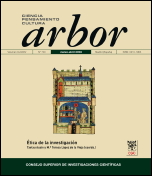Private intellectual property and research as a public service
DOI:
https://doi.org/10.3989/arbor.2008.i730.181Keywords:
Intellectual property, ownership, academic research, legal servitudes, privatization, linguistic entities, ideal objects, copyright, copyleft, scientific publicationsAbstract
Intellectual property has arisen in our societies in order to solve problems brought about by technical evolution. Some authors regard it as a sui generis notion, other people reject it altogether. Our approach stresses the similarity between this sort of property and ownership in general. We propose a relative justification of intellectual ownership. Those proposals are bound up with a metaphysical elucidation of the intellectual objects of ownership; we put forward viewing them as clusters of possibilia. Intellectual ownership thus vindicated has to fulfil a social function, by resorting to the legal notion of easements or servitudes, whether voluntary or legally binding, especially as regards the outputs of scientific research. We demur at privatizing the benefits derived from publicly funded research.
Downloads
References
Arrabal, Pablo (2000): Manual práctico de Propiedad intelectual e industrial, Barcelona, Ediciones Gestión.
Becker, Lawrence C. (1977): Property Rights. Philosophical Foundations, Londres, Routledge and K.P.
Bercovitz, Rodrigo y otros (2003): Manual de la propiedad intelectual, Madrid, Tirant lo Blanch.
Cámara Águila, M.ª del Pilar (1998): El derecho moral del autor, Granada, Editorial Comares.
Colombet, Claude (1997): Propriété littéraire et artistique et droits voisins, París, Dalloz, 8.ª ed.
Gautier, Pierre-Yves (2001): Propriété littérraire et artistique, Paris, PUF, 4.ª ed.
Grunebaum, James O. (1987): Private Ownership, Londres, Routledge.
Hettinger, Edwin C. (1989): “Justifying intellectual property”, Philosophy and Public Affairs, 18/1, pp. 31-52.
Lessig, Lawrence (2004): Free Culture: How Big Media Uses Technology and the Law to Lock Down Culture and Control Creativity, Penguin.
Molina, Juan Marco (1995): La propiedad intelectual en la legislación española, Madrid, Marcial Pons.
Pérez de Ontiveros, Carmen (1993): Derecho de autor: la facultad de decidir la divulgación, Madrid, Civitas.
Pievatolo, Maria Chiara: “Il mercante e il califfo: politiche della proprietè intellettuale”, http://eprints.rclis.org/archive/00010428/01/fichte.pdf
Rams Albesa, Joaquín (2005): “Las obras en dominio público”, en La duración de la propiedad intelectual y las obras en dominio público, coord. por Carlos Rogel Vide, Madrid, Reus.
Rodríguez Tapia, J. Miguel y Bondía Román, Fernando (1997): Comentarios a la ley de propiedad intelectual (Texto refundido 1996), Madrid, Civitas.
Sagot-Duvauroux, Dominique (2002): La propriété intellectuelle, c’est le vol! Les majorats littéraires de Proudhon et autres textes choisis et présentés, Dijon, Les Presses du réel.
Valdés Díaz, Caridad del Carmen (2006): “Acerca de la autoría y la titularidad en el contexto jurídico cubano. ¿El Estado como titular del derecho de autor?”, Revista General de Legislación y Jurisprudencia, CLIII, n.º 3, pp. 435-66.
Rogel Vide, Carlos (coord.) (2002): En torno a los derechos morales de los creadores, Madrid, Reus.
Ryan, Alan (1984): Property and Political Theory, Londres, Blackwell.
Waldron, Jeremy (1988): The right to private property, Oxford, Clarendon.
Downloads
Published
How to Cite
Issue
Section
License
Copyright (c) 2008 Consejo Superior de Investigaciones Científicas (CSIC)

This work is licensed under a Creative Commons Attribution 4.0 International License.
© CSIC. Manuscripts published in both the printed and online versions of this Journal are the property of Consejo Superior de Investigaciones Científicas, and quoting this source is a requirement for any partial or full reproduction.All contents of this electronic edition, except where otherwise noted, are distributed under a “Creative Commons Attribution 4.0 International” (CC BY 4.0) License. You may read here the basic information and the legal text of the license. The indication of the CC BY 4.0 License must be expressly stated in this way when necessary.
Self-archiving in repositories, personal webpages or similar, of any version other than the published by the Editor, is not allowed.















